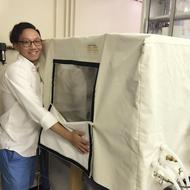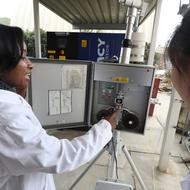UNDERSTANDING ENVIRONMENTAL EXPOSURES:
SAFEGUARDING PUBLIC HEALTH THROUGH RESEARCH AND ANALYSIS
Overview
In 2017, CE-CERT joined an innovative partnership to determine the effects of various air pollutants on human health. The BREATHE (Bridging Regional Ecology, Aerosolized Toxins, and Health Effects) Center at the UC Riverside School of Medicine is an interdisciplinary collaboration with a diverse group of UC Riverside faculty working together to conduct research on topics such as regional climate modeling, and the health impacts of aerosolized particles such as dust, pollens, and pollutants. The collaboration also addresses social and policy issues surrounding air quality, with research interests in environmental justice and health disparities, and culture and policy studies on air quality and health.

